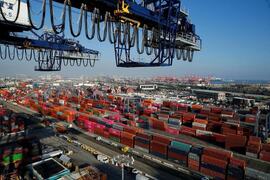The United States is enjoying an energy bonanza thanks to shale gas, making it a magnet for industry, reducing import dependence and challenging Europe as it battles to dig itself out of recession, energy officials say.
Panellists at a weekend security conference in Munich warned Europe must develop a strategy on how to tap its own resources in order to keep energy costs competitive, or risk seeing power-intensive industries locate elsewhere.
"The shale gas and oil boom is already underway. As Europe continues to debate it, North America is reaping the advantages," said Jorma Ollila, Chairman of Royal Dutch Shell .
Just a week ago Shell signed a $10 billion shale gas deal with Ukraine - the biggest contract yet in Europe - which could help Ukraine ease its reliance on Russian gas imports. Ukraine is said to have Europe's third-largest shale gas reserves at 42 trillion cubic feet (1.2 trillion cubic metres), according to the US Energy Information Administration.
Its reserves are dwarved by those of France however, estimated to be Europe's largest at 180 trillion cubic feet. France has banned the procedure, known as fracking which is used to extract shale gas and which involves pumping vast quantities of water and chemicals at high pressure through drill holes to prop open shale rocks.
Environmentalists fear it could increase seismic risks and pollute drinking water. US officials question this and say that thanks to the higher proportion of gas use the United States has had its lowest carbon dioxide emissions in 20 years.
"Observing this from across the Atlantic it is really quite remarkable that there should be a ban or a go-slow on this development in Europe, really without any facts," said Daniel Yergin, Vice-Chairman of IHS Cambridge Energy Research. Fracking is used to produce a third of US natural gas he said, showing the environmental impact can be managed.
World energy market flows already reflect North America's scramble to exploit shale oil and gas and highlight the potential prize Europe is ignoring.
"The US internal energy revolution and the radical increases in production of oil and gas have boosted gas production by 25 percent and seen oil import dependence drop from 60 percent to 40 percent, and expected to decline further to 30 percent," said Carlos Pascual, the US special envoy for energy affairs. While Europe retains deep environmental concerns it also acknowledges that with the price of gas in the United States just a third of that in Germany, its industry is already suffering the effects. German Economy Minister Philipp Roesler said: "Many German firms have opted for (relocation to) the United States, saying energy prices were the decisive factor...We are already seeing that we are suffering with our higher energy pricesit affects our own competiveness."
BR100
15,115
Increased By
28.1 (0.19%)
BR30
43,048
Increased By
175.6 (0.41%)
KSE100
149,493
Increased By
257.8 (0.17%)
KSE30
45,518
Increased By
11.6 (0.03%)























Comments
Comments are closed.